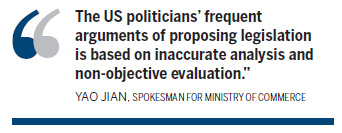US high-tech export curbs 'cause of deficit'
Restrictions on high-tech exports to China, rather than the Chinese currency, are the "major source" of the US trade deficit with China, the Ministry of Commerce (MOC) said on Wednesday.
The ministry said that China will bring the issue to the negotiating table during the two-day China-US Joint Commission on Commerce and Trade to be held in Washington.
The ministry also said it would give a commitment to boost imports to help balance trade next year.
Earlier this week, two US senators said they are seeking legislation to place high duties on Chinese exporters in response to what they call China's "undervalued currency".
The US also said it will raise the currency issue during the China-US meeting on Wednesday.
"The US politicians' frequent arguments of proposing legislation is based on inaccurate analysis and non-objective evaluation," said ministry spokesman Yao Jian.
The major reason behind the trade imbalance is "US export control", Yao said.
It is estimated that only 7 percent of China's high-tech imports, in terms of value, are from the US.
Many economists also echoed the ministry's view.
"How to address the trade imbalance depends on whether the US would like to loosen restrictions on high-tech exports to China, rather than concentrate on yuan appreciation. If there were no such controls, China's imports from the US would rise sharply and the US trade deficit would narrow," said Yao Zhizhong, senior researcher on China-US economic and trade relations with the Chinese Academy of Social Sciences.
From 2005 to 2008, China's yuan gained 21.1 percent against the dollar, but during the same period, the US deficit with China still widened.
"This fully shows currency appreciation cannot solve the trade imbalance," said Zhang Yesui, Chinese ambassador to the US, at a recent forum.

According to Yao, the top two concerns for China's exporters are "rising costs and yuan appreciation".
Vice-Premier Wang Qishan led a delegation comprised of 100 officials to the Washington meeting, during which "China will urge the US to take substantive measures to loosen restrictions on its exports to China, especially high-tech products", said Yao.
"Both sides agreed that maintaining healthy and stable Sino-US economic relations concerns the fundamental interests of the people of the two countries," said a Xinhua report.
Other topics China is concerned about include recognition of China's market economy status, lowering barriers for Chinese investment in the US and agricultural exports to the US.
According to statistics from the customs, from January to November, China's imports from the US grew by 32.2 percent from a year earlier, while its exports to the US rose 29.5 percent year-on-year.
 0
0 






